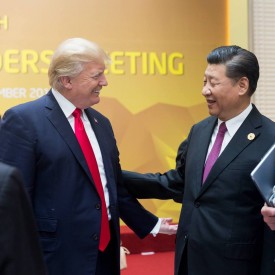China Sets Terms for Ending Trade War

China, for the first time, made clear what it wants to see from the U.S. in talks to end their trade war, laying bare the deep differences that still exist between the two sides.
This story by Bloomberg appeared in Automotive News.
In a wide-ranging interview with Chinese media after talks in Washington ended Friday, Vice Premier Liu He said that in order to reach an agreement the U.S. must remove all extra tariffs, set targets for Chinese purchases of goods in line with real demand and ensure that the text of the deal is “balanced” to ensure the “dignity” of both nations.
Liu’s three conditions underscore the work still to be done if an accord is to be reached between the world’s two largest economies. President Donald Trump’s administration told China it has a month to seal a trade deal or face tariffs on all its exports to the U.S.
That threat was made during talks Friday in Washington, hours after Trump upped the ante by imposing a second round of punitive duties on $200 billion of Chinese goods ranging from cooked vegetables to various auto parts.
The talks are under close scrutiny across global financial markets, and U.S. stocks turned positive after negotiators on both sides said the session had gone fairly well.
Liu said both sides agreed to keep talking despite what he called “some temporary resistance and distractions,’’ and to hold future meetings in Beijing. He dismissed the idea that talks had broken down.
In a series of tweets that cheered markets, Trump declared Friday that the talks with China had been candid and constructive. “The relationship between President Xi and myself remains a very strong one, and conversations into the future will continue,” he said. Further talks are possible, but there’s no immediate plan for the next round, according to a person familiar with the negotiations.
Liu’s comments reveal a new fault line. Whereas U.S. negotiators previously accused China of walking back on commitments to change laws on technology transfer and other issues, Liu argued that the U.S. team is pushing for bigger Chinese purchases to level the trade imbalance than had originally been agreed.


